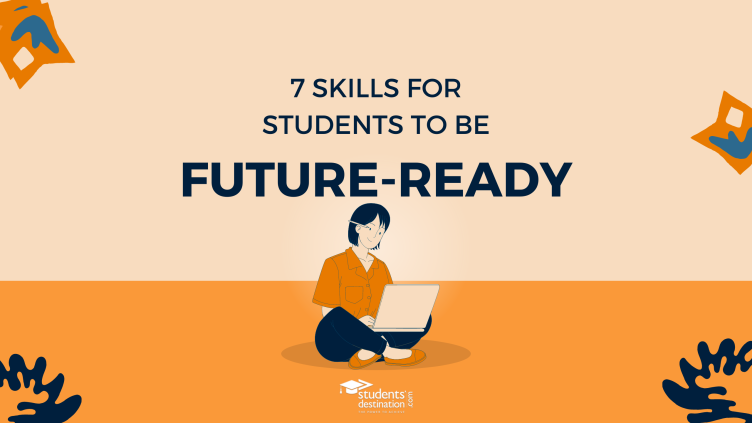Author: admin1
Crush Your Career Goals: Top Career Advice for Gen-Z’s
You’re in your twenties, and you’ve got the world at your fingertips. The choices you make now will shape the trajectory of your career, so it’s crucial to take action and set yourself up for success. But where do you start? Don’t worry, we’ve got you covered. In this blog, we’ll share some of the juiciest career guidance advice for students in their 20s.
Get out there and explore!
Life is too short to stick to the familiar. In your twenties, you have the time and freedom to explore your passions and try new things. Take advantage of your college years to take classes outside your major, join clubs and organizations, and attend events and conferences. By broadening your horizons, you’ll discover new interests and open yourself up to exciting career opportunities you may never have considered before.
Build your skills like a boss!
Your twenties are the perfect time to build your skills and develop your talents. Take advantage of internships, co-op programs, and other experiential learning opportunities to gain hands-on experience in your field of interest. Not only will this help you build your resume, but it will also give you valuable insight into what a career in your chosen field would look like. Identify the skills that are most in-demand in your field and work to develop them. By building your skills, you’ll make yourself an irresistible candidate to potential employers.
Network like a pro!
Networking is the key to building a successful career, so start building your network early. Attend career fairs, networking events, and industry conferences to meet people in your field of interest. Connect with alumni and professionals on LinkedIn and reach out to them for informational interviews or job shadowing opportunities. Your network can provide you with invaluable insights and connections that will help you launch your career.
Find a mentor and get mentored!
Mentors can be a game-changer in your career journey. They can provide valuable guidance and support as you navigate your career path. Look for people in your field of interest who you admire and respect, and reach out to them for mentorship. They can offer advice, share their experiences, and help you identify opportunities for growth and development.
Stay flexible and adaptable like a ninja!
The job market is constantly changing, and your interests and goals may evolve over time. Be prepared to be flexible and adaptable in your career journey. Don’t be afraid to pivot if you need to. Remember, your twenties are a time of exploration and discovery, so don’t be afraid to take risks and try new things. Stay open to new opportunities and experiences, and be ready to take on whatever the future holds.
In conclusion, your twenties are a time of tremendous opportunity and growth. By exploring your interests, building your skills, networking, finding a mentor, and staying flexible and adaptable, you can set yourself up for a successful and fulfilling career. So go out there, grab life by the horns, and take the first step towards building the career of your dreams!
Navigating Social Media for Your Career: A Student’s Guide
Social media has revolutionized the way we communicate, interact, and engage with the world around us. From connecting with friends and family to networking with professionals and businesses, social media has become an integral part of our daily lives.
However, its impact on our careers cannot be overlooked. In this blog, we will explore the impact of social media on career development and provide tips on how students can use it to their advantage.
Personal Branding
Social media provides a platform for individuals to create and showcase their personal brand. This includes highlighting their strengths, skills, and accomplishments. By leveraging social media, students can position themselves as experts in their field and stand out from the crowd. This can help them gain recognition, build credibility, and increase their chances of securing job opportunities.
Networking
Social media platforms like LinkedIn and Twitter are valuable tools for networking. Students can connect with professionals in their field, join relevant groups, and engage in discussions. This can help them expand their network, learn from others, and get their foot in the door of their desired industry.
Research
Social media can also be used for research. Students can gain insights into their target companies and industries by following them on social media. This can help them stay up-to-date with industry trends, understand the company culture, and even gain a competitive advantage during the interview process.
Job Search
Social media platforms like LinkedIn and Indeed are commonly used for job searching. By creating a profile, students can showcase their skills and experience to potential employers. Additionally, they can follow companies and job boards for relevant job postings.
Professional Development
Social media can also be used for professional development. Students can follow industry leaders and influencers, read articles, and participate in online courses and webinars. This can help them stay current with industry trends and gain new skills and knowledge.
——————————
While social media can be a valuable tool for career development, it’s important to use it wisely. Here are some tips to keep in mind:
Be professional: Keep your social media profiles clean and professional. Avoid posting anything that could be deemed as inappropriate or offensive.
Be strategic
Use social media intentionally. Identify your career goals and use social media to help you achieve them.
Be active
Consistently engage with others on social media. This includes sharing articles, commenting on posts, and participating in discussions.
Be mindful
Remember that social media is a public platform. Before posting anything, consider how it could impact your personal brand and career prospects.
Social media can have a significant impact on career development. By leveraging its power, students can position themselves for success in their desired industry. However, it’s important to use it wisely and strategically.
By following the tips outlined in this blog, students can use social media to their advantage and unlock new career opportunities.
Beyond Borders: How to Choose the Perfect Career Option Abroad
Are you dreaming of a career that takes you around the world? Do you long to live and work in a new country, surrounded by new cultures and experiences? Choosing a career abroad can be an incredible adventure, but it can also be overwhelming. With so many options to consider, it can be difficult to know where to start. In this blog, we’ll share essential tips and tricks to help you choose a thriving career option abroad and make the most of this life-changing experience.
Research, Research, Research!
The first step in choosing a career abroad is to do your research. This involves researching the job market in the country you’re interested in, identifying in-demand industries and jobs, and exploring the cultural and social aspects of living and working abroad. Start by reading job descriptions and employment trends in your field of interest, and find out which countries offer the best opportunities for growth and development.
Consider Your Language Skills
One of the most important factors in choosing a career abroad is your language skills. If you’re interested in working in a non-English speaking country, you’ll need to have a good command of the local language. Consider taking language courses or attending language immersion programs to improve your language skills. You can also explore jobs in international companies that require bilingual or multilingual employees.
Seek Advice from Experts
Talking to people who have experience working and living abroad can provide you with invaluable insights and guidance. Reach out to alumni, career counselors, or industry experts who have experience working in the country you’re interested in. Ask for their advice and insights on job opportunities, cultural norms, and the job market in their respective countries. This will help you get a realistic view of what to expect when working abroad.
Consider Your Personal Preferences
Choosing a career abroad is not just about finding the right job, it’s also about finding the right lifestyle. Consider your personal preferences, such as the type of work environment you prefer, the type of city or town you want to live in, and the type of social and cultural activities you enjoy. These factors will help you identify the best career options that align with your personal goals and preferences.
Be Flexible and Adaptable
Working and living abroad can be a challenging and rewarding experience, but it also requires flexibility and adaptability. Be open to new experiences and challenges, and be willing to learn new skills and ways of working. You may need to adjust your expectations and adapt to new cultural norms, so be prepared to be patient and open-minded.
Choosing a career abroad can be a thrilling and transformative experience that offers a world of opportunities. By doing your research, seeking advice from experts, considering your personal preferences, and being open-minded and adaptable, you can find the right career option that aligns with your dreams and aspirations.
Don’t be afraid to take the leap and explore the possibilities of a career abroad. With hard work, dedication, and a sense of adventure, you can make your dreams of working and living abroad a reality.
So, what are you waiting for?
Start exploring your options today!
Ace Your Next Job Interview: The Ultimate Guide for Students
Preparing for job interviews and negotiations can be a daunting task, especially for students who are just starting their careers. However, with the right preparation and mindset, you can increase your chances of success. Here are some tips on how to prepare for job interviews and negotiations.
RESEARCH THE COMPANY
Before your job interview, it is important to research the company you are interviewing with. Visit their website, read about their mission, values, and products or services. Learn about their competitors, and find out any recent news or developments. This can help you tailor your responses to the company’s needs and goals.
PRACTICE COMMON QUESTIONS
Many job interviews include common questions such as “Tell me about yourself” or “What are your strengths and weaknesses?” Practice answering these questions with a friend or family member, and focus on delivering your responses with confidence and clarity.
DRESS PROFESSIONALLY
It is important to dress professionally for your job interview, even if the company has a casual dress code. Dressing professionally shows that you take the interview seriously and are respectful of the interviewer’s time. Choose attire that is appropriate for the company culture and the position you are applying for.
PRACTICE NEGOTIATION SKILLS
Negotiation skills are important both in job interviews and in your career. Practice negotiating with a friend or family member, or consider taking a negotiation course. This can help you feel more confident in negotiations and achieve better outcomes.
KNOW YOUR VALUE
When negotiating job offers, it is important to know your value and what you bring to the table. Research salary ranges for similar positions in your industry and geographic location and be prepared to negotiate for fair compensation and benefits.
FOLLOW UP
After your job interview or negotiation, follow up with a thank-you note or email. This can show your appreciation for the opportunity and keep you top of mind with the interviewer or negotiation counterpart.
In a nutshell, preparing for job interviews and negotiations can be nerve-wracking, but with the right mindset and preparation, you can increase your chances of success. By researching the company, practicing common questions, dressing professionally, practicing negotiation skills, knowing your value, and following up, you can put your best foot forward and achieve success in your career.
The Future-Ready Student: 7 Soft Skills for Success
Soft skills are often overlooked but are essential for students to be future-ready and succeed in their careers. These skills are not taught in textbooks but are developed through real-life experiences and interactions. In this blog post, we will discuss seven important soft skills that students should develop to be future-ready.
Communication
Effective communication is the key to success in any career. Students should learn how to communicate effectively with others, both verbally and in writing. Good communication skills help in building relationships, teamwork, and resolving conflicts.
Collaboration
Collaboration is another essential soft skill for students to develop. Students should learn how to work effectively with others towards a common goal. Collaborating with others fosters creativity and innovation, and helps students to learn from one another.
Critical thinking
Critical thinking involves analyzing and evaluating information to make informed decisions. Students should learn how to identify problems, evaluate different solutions, and choose the best course of action. This skill helps students to become better problem-solvers and decision-makers.
Problem-solving
Problem-solving is a valuable skill that helps students to identify and solve problems creatively and effectively. Students should learn how to think outside the box, explore different solutions, and implement the best one.
Adaptability
Adaptability is an essential skill in today’s rapidly changing work environment. Students should learn how to adjust to changing circumstances, learn new skills quickly, and remain productive in the face of uncertainty.
Time management
Time management is crucial for meeting deadlines and achieving goals. Students should learn how to prioritize tasks, manage their time effectively, and avoid procrastination.
Emotional intelligence
Emotional intelligence involves understanding and managing one’s own emotions and the emotions of others. Students should learn how to develop empathy, build strong relationships, and work effectively in a team.
In conclusion, developing these seven soft skills is crucial for students to be future-ready and succeed in their personal and professional lives. By focusing on these skills, students can become better communicators, collaborators, critical thinkers, problem-solvers, and team players.






